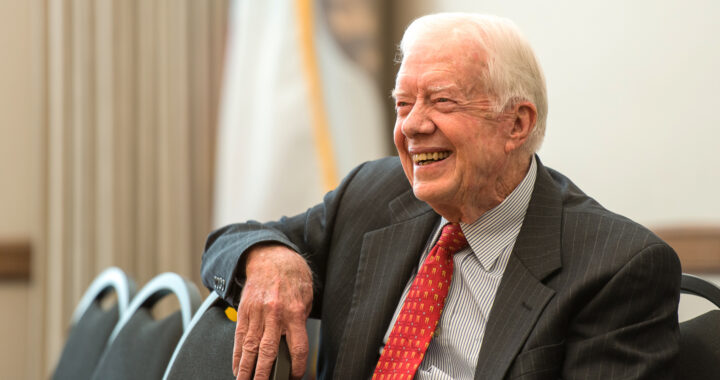He was not a massively popular president during his term. Jimmy Carter started his term as the 39th President of the United States with an approval rating of 57 percent by the end of 1977 but it went down to 34 percent by the end of 1980. His approval rating throughout his term averaged at 45.5 percent. Hence, when he ran for his second term in the 1980 U.S. presidential election, he lost to Republican Ronald Reagan.
The decline in his ratings was attributed to poor economic conditions like high inflation, persistent high unemployment rates, and energy crisis, as well as international incidents like the Iranian Hostage Crisis and the Soviet invasion of Afghanistan that started in 1979. However, upon his retreat back to private life, he remained engaged in public affairs. Jimmy Carter was even awarded the Nobel Peace Prize in 2002.
Why Did Jimmy Carter Win the Nobel Peace Prize in 2002: Legacy After His Presidency
The Nobel Foundation, specifically the Norwegian Nobel Committee, noted that it awarded Jimmy Carter the Nobel Peace Prize in 2002 “for his decades of untiring effort to find peaceful solutions to international conflicts, to advance democracy and human rights, and to promote economic and social development.” The Chairman of the Nobel Committee also explained that it ought to award him as early as 1978 when he successfully mediated a peace agreement between Egypt and Israel. Nonetheless, after his presidency, Carter involved himself in various peace and mediation campaigns. His popularity resurfaced through these endeavors.
1978 Camp David Accords
Carter brokered the historic peace agreement between Egypt and Israel. He invited Egyptian President Anwar Sadat and Israeli Prime Minister Menachem Begin to Camp David in Maryland for intensive negotiations that lasted for 13 days. His specific roles include building trust between the two leaders, proposing compromises, and suggesting solutions to contentious issues.
The intensive negotiations resulted in the 1978 Camp David Accords in which Israel agreed to withdraw from the Sinai Peninsula and return the disputed territory to Egypt. It was the first Arab-Israeli peace treaty. This ended decades of armed conflicts and uncertainties. The agreement also set a precedent for peace efforts in the Near East and the Middle East.
Global Peace and Conflict Resolution
Carter became involved in foreign policy and international relations issues after his presidency. He brokered peace agreements between warring factions in Sudan from the 1980s to the 1990s. The Carter Center was also founded in 1982. This nonprofit organization facilitated the 1980s and 1990s talks between Ethiopia and Eritrea to end their border disputes.
Furthermore, in 1994, he negotiated directly with North Korean leader Kim Il-sung to defuse a nuclear crisis in the Korean Peninsula and headed a U.S. delegation to Haiti to negotiate the peaceful departure of the military junta. Carter also negotiated the Nairobi Agreement in 1999 between Sudan and Uganda to ease cross-border tensions.
Carter Center Establishment
The nongovernment and nonprofit organization Carter Center was founded by Jimmy Carter and his wife Rosalynn Carter in 1982 with the goal of promoting human rights and relieving human suffering. It now has projects in over 80 countries and has been involved in election monitoring, democracy-building, conflict mediation, and human rights advocacy.
Moreover, the organization is also involved in efforts to treat neglected tropical diseases. It led the campaign to treat dracunculiasis or the Guinea-worm disease, as well as onchocerciasis, trachoma, lymphatic filariasis, and malaria. Carter Center also has programs for promoting mental health awareness and strengthening agricultural production.
From Being Below-Average President to Nobel Recipient: The Jimmy Carter Legacy
Scholars and even several Democrats viewed the presidency of Jimmy Carter as a failure. A survey of historians also ranked him as one of the worst presidents in U.S. history. The unfavorable economic conditions of the U.S. and chaotic American foreign policy during his term overshadowed his policy achievements like the creation of the Department of Energy and Department of Education, and the Camp David Accords and the Panama Canal Treaties. Nevertheless, despite what others deemed as a below-average president, history has been kind to him. This is due to his post-presidency activities and his efforts at the Carter Center. He dedicated his private life to public service and focused on peace and conflict resolution across the world.
Photo Credit: 2013.02.24 RITGER_Jimmy Carter_007/FlickerviewR/CC-BY-2.0/Adapted
